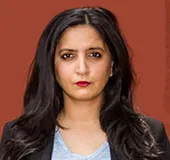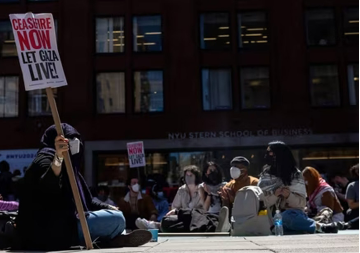
Martin Muller is sipping on a soft drink at a pub in Weimar in erstwhile East Germany. He is on paleo diet and off liquor. A 40 years old buffed-up and bald Martin is a nurse in the local hospital but also works in private clinics.
“Gaddafi’s general and a Libyan rebel both are in our hospital and neither wants to be treated by a female nurse,” he says. “I told them this is not Libya, that’s the nurse they get and if they don’t want to be treated by her, they can leave,” Martin asserted.
He voted for Germany’s far-right political party — Alternative for Deustchland or the AfD — because the presence of refugees from Libya, Syria and Afghanistan worries him. He alleges most of the Muslim refugees are unable to mingle.
“If I go to Syria or to Saudi, I will follow their rules. If they say you can’t even look at a woman, I won’t. But they come here and think any girl wearing shorts is giving them an invitation,” Martin says looking at his girlfriend, seated next to him. She though has never had such an experience.
Mass sexual assaults on the new year eve in December 2015 have made some Germans suspicious of refugees.
“They have never teased me, but it happened in Koln,” she says.
Mass sexual assaults on the new year eve in December 2015 have made some Germans suspicious of refugees, but for those like Martin and his girlfriend — who is incidentally wearing a sweat shirt of a Neo-Nazi punk band called 'Onkelz' — the Koln incident seems to be more of an excuse to lambast the refugees.
Martin uses cultural differences as his rationale to question their presence and instead of integration, demands expulsion of the refugees from Germany.
“If it were me, I would want to go back home, wouldn’t they?” he asks rhetorically. His question reflects a complete ignorance of the destruction in Syria in the seven-year long war. According to the world bank, Syria needs 200 billion US Dollars to reconstruct large chunks of its cities lying in rubble. There is no electricity. Water is scarce. There is little to no work and it would take years if not decades before the war-torn areas are resettled.
Having a chance to talk to a journalist, Martin carries on, “the Syrian boys are constantly chatting with their friends in Syria on social media and guiding them on how to fool the German State,” he says wrinkling his nose in disgust, “So, they can also come to Germany to abuse our social welfare system.”
The boys Martin speaks of are more of an aberration than the norm.
It is true that Syrians opted for Germany over eastern European nations but they did so primarily because they thought a rich state may be able to absorb them and provide them with jobs. The dominant reason for the Syrians to leave is their concern for safety and that is why a majority are languishing in camps in Lebanon and Turkey.
It is true that Syrians opted for Germany over eastern European nations but they did so primarily because they thought a rich state may be able to absorb them and provide them with jobs.
Martin’s opinion — that the Syrians marched to Germany to exploit its wealth — is harboured by many Germans, especially in the east which voted massively in the favour of AfD. Twenty seven per cent of Saxon vote in the east went to the far-right party. There are many reasons behind the decision. The East has always felt leftout and betrayed by the wealthier West. The sentiment amongst the relatively worse-off is — if the state has extra money, why does it not spend it on the ageing population or on unemployment allowance, than helping the refugees? The vote may have swung in AfD’s direction for economic issues — real or perceived — but that was certainly not the leading cause. East Germans like Martin live perfectly comfortable middle or upper middle class lives, but still voted against Merkel’s refugee policy.
Read | Syria’s lost generation

Twenty six per cent East German men opted for an ideology that calls for banning burqas and minarets based on a blind fear of the other.
‘Citizens for Erfurt’
A 30-minute ride on Deutsche Bahn from Weimar takes you to Erfurt; the capital of the state of Thuringia in the east. Famous for its fairy tale look, Erfurt invites hordes of tourists every year. Central to its appeal is the cathedral where Martin Luther — the priest accredited with bringing about the protestant reformation — was ordained.
Around the dome, at ‘Wirsthaus Christoffel’ restaurant, tourists are queuing up to sample medieval German cuisine. Roasted pork is the main attraction.
A short drive from the dome is Maarbach. Here, entrails of a pig were displayed as a threat. At least on two occasions, a pig’s head, feet and bowels were strewn around on a plot reserved for the construction of a mosque. A group that calls itself ‘Citizens for Erfurt’, erected giant crosses on the site and suggested they are fighting to preserve Erfurt’s culture. Implying Erfurt’s culture is Christian and unwelcoming to the idea of a mosque. Officially, the AfD called it a land grab project and since 2016, the party has been organising rallies opposing the mosque in tandem with the PGEIDA movement which conducted several marches under the banner ‘Islamisation of the West’.
Freda Ataman, an activist who runs “Mediendienst Integration," a portal dispelling unsubstantiated fears on immigrants, says, “This is a daily affair,” Freda is alluding to hate crimes. “Someone had to tell the refugees they are not wanted, so the dead pig was hung.”
Interestingly though, the demand for the mosque hasn’t come from the Syrians but the Ahmaddiya community; one of the oldest Muslim communities in Germany which comprises immigrants from Pakistan. As in other ongoing battles over public space wrapped in identity politics, facts here too are a casualty.
As in other ongoing battles over public space wrapped in identity politics, facts here too are a casualty.
Georg Heil, an acclaimed journalist who has worked extensively on terror group ISIS and its presence in Europe says, “The protests are not rational at all. The protestors do not care about details — like the fact that the Ahmadiyya community speaks out against any kind of extremism. These protests are driven by rightwing radicals and Neo-Nazis. It is basically about racism, Islamophobia and xenophobia.”
Freda is not shocked by the racism against Muslim immigrants. She was born to Turkish parents in Germany and is a German citizen but continues to fight discrimination every day.
“They ask me where do I come from, I am from here," Freda says as we discuss the challenges facing her country.
“Germany has seen different waves of immigration but the European immigrants are dealt with very differently than the Muslims. Basically, some Germans fear Islam. Iranians didn’t wear obvious symbols of religion so they are good immigrants but if you wear a hijab or want a mosque, then there is a problem,” Freda adds.
Angela Merkel welcomed the refugees but despite her ‘We can do it’ mantra, leaders of her party have continued to make divisive statements. To rope in the conservative voters before elections in September last year, Interior Minister of the CDU, Mr Thomas de Maiziere said, ‘We are not Burqa’ and spoke of the need of ‘Leitkultur’ or Germany’s leading culture.
There is no agreed definition of ‘Leitkultur’. Is it following German traditions? Abiding by German laws? Or being German citizens with Christian characteristics? So far there is no consensus.
Georg says, “Some would claim it is about the preservation of the Christian-Jewish heritage of this country and its values. In my view, many people who talk about Leitkultur are not really concerned about Christian values, they rather just want immigrants to behave like Germans — or how they think Germans are.”
Freda talks about a new Germany in the making, “We propose ‘Leitbild’ what Germany should be and not what it was.”

Martin finds looking ahead difficult because he feels wrongly blamed for the deeds of a mad regime. In Germany, there is a lingering sense of guilt decades after the second world war. Generations of Germans are shackled to the past and one way to cope with it is to opt for Über nationalist AfD.
Xenophobia, Islamophobia and return of nationalism are the running themes in the power centre of Europe and are engraving newer fault lines.
“Why should Germans feel ashamed about WWII? The US, the French, the English have killed so many people in different wars, understanding his statement could be seen to be a denial of the holocaust, Martin adds, “We will never be Nazi Germany again but that doesn’t mean we need monuments of shame.”
In the memory of the holocaust, a ‘Memorial of the killed Jews’ was built. AfD called for its removal and has succeeded in convincing 12.6% of Germany that it is about shame and not learning from history.
Xenophobia, Islamophobia and return of nationalism are the running themes in the power centre of Europe and are engraving newer fault lines.
Anti-refugee protests
Last week, 2,000 anti-refugee Germans protested in the east German city of Cottbus and displayed hateful banners. One among them read — "Islamisation is like a cancerous ulcer and is the greatest danger to mankind." Demonstrations were also organised in support of the refugees but these were upstaged and outnumbered by those in opposition.
The rate of violence both against and by the refugees in east Germany has gone up since the turn of year. There are serious questions if the immigrants will manage to coexist peacefully with the locals.
The AfD is capitalising on this ‘fear of the other’ amongst Germans like Martin. The gravest error on the part of Angela Merkel’s CDU and Martin Shultz’s SPD has been the failure in communicating effectively and assuaging some of the valid concerns of their people but mostly tackling their unfounded apprehensions.
Apart from imparting language skills, integration in Germany must include social and cultural assimilation. The German government should actively come-up with programmes which facilitate an understanding between the Germans and the refugees.
The biggest challenge for the Germans is perhaps introspecting who is a German and what do they want Germany’s future to be. Burdened with a Nazi past, the soul of Germany has a chance at atonement, will it embrace an inclusive new identity and become an example for Europe?
The views expressed above belong to the author(s). ORF research and analyses now available on Telegram! Click here to access our curated content — blogs, longforms and interviews.






 PREV
PREV


